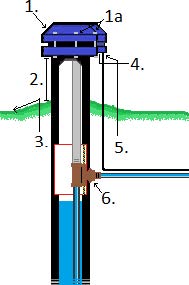Private Well Water Systems in Connecticut - Best Management Practice Checklist
In Connecticut, there are currently no maintenance requirements for private well water systems. Private well owners are responsible for the quality of their private well water and maintenance of their well water systems. Poorly maintained well water systems can act as a conduit for pollutants to enter your home drinking water.
Proper maintenance and operation of your well water system is an essential component to protecting the water quality supplied by your well. Even with proper maintenance, well water system equipment will eventually need repair or replacement. Consider performing the following items to be proactive in promoting the health and longevity of your well water supply and system:
- Test the quality of your well water; refer to our guidance on Private Well Testing.
- Keep the area around your well accessible.
- Limit activities around your well that may contaminate your water supply, such as over applying products used to melt snow and ice, fertilizers, pesticides and herbicides.
- Keep hazardous chemicals and potential contaminants, such as paint, fuel, lawn chemicals, products used to melt snow and ice and other chemicals away from your well and store them in watertight containers.
- Be aware of local land use activities that may affect your well water quality.
- At least annually, inspect the exposed well casing and the area around it:
- Is the exposed well steel casing in good shape?
- Look for cracks, holes, or signs of corrosion.
- Is the well cap watertight?
- Check Bolts, rubber gasket, and seals.
- If there is an electrical conduit at the well cap, is it watertight?
- Is the top of your well casing at least six inches above the ground?
- Does the ground around the well casing slope away from the casing?
- Is the exposed well steel casing in good shape?
|
|
DRILLED WELLS:
|
 |
DUG WELLS:
|
- If your well is located inside a well pit, periodically check the well pit throughout the year, especially after rainfall events, to ensure it is dry.
- Well pits should be watertight or suitably drained to ensure dryness of the pit. Well pits that do not meet these criteria are subject to flooding and may result in the well head being submerged and may allow contaminated water to enter your well.
- If you discover that you well pit has standing water, you should contact a well contractor to inspect your well and well pit and discuss options for: 1) making the well pit watertight, 2) installing a drain to daylight that will keep the pit dry at all times, or 3) extending the well casing, installing a watertight pitless adapter and watertight well cap, and backfilling the well pit.
- Take precautions to prevent the well from being struck by motorized machinery, such as lawnmowers or vehicles.
- Prevent cross connections by installing hose bibb vacuum breakers on outdoor spigots.
- Never submerge a water hose inside any type of container when mixing chemicals or solutions.
- If there are old unused wells on your property, have them properly abandoned by a registered well driller.
- If your well, well pump or water system requires repair or maintenance be sure to use an appropriately licensed contractor.
- Have your well water system inspected every five to ten years by a licensed professional.
- Check the function of the well pump and its components.
- Inspect the well tank and its components.
- Inspect the integrity of the well head.
- Keep all well records, such as well completion and water quality reports in a safe, accessible place.
Remember that private well owners are responsible for their private well water systems. When you routinely care for your well and system components, you improve your chances of avoiding a catastrophic problem in the future.
For more information regarding private wells please contact: CT Department of Public Health, Private Well Program, (860) 509-8401 www.ct.gov/dph/privatewells, and, TestYourWell.ct.gov


